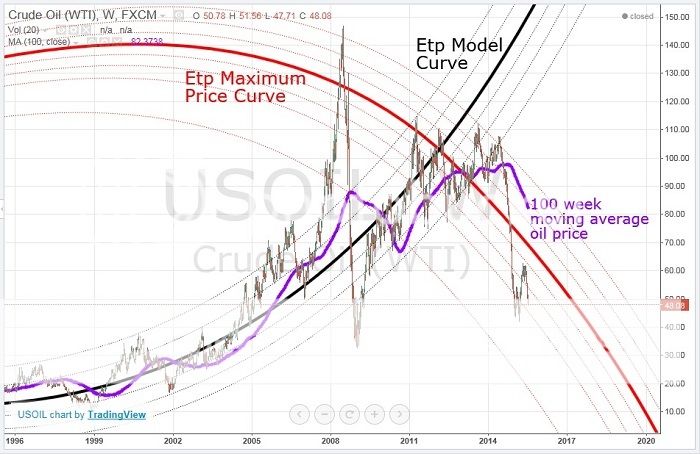You are correct, I misspoke (miswrote?). Thanks for being a stickler for details. I made the correction in my post.For example, what you just said is gibberish because EROEI does not have units of money, it has units of energy.
I am reasonably sure that is a lie, Russ. But I am not calling you a liar.Actually, despite the fact that I haven't been provided the details of the model and therefore can't be expected to understand it very well, I'm reasonably certain I understand it better than you.
It isn't that mysterious, Russ.By what mechanism, specifically, did that happen? IE, a barrel of oil, sitting in the ground and recoverable at 60abarrelsuddenlybecameuneconomicaltorecoverat 60 a barrel suddenly became uneconomical to recover at 50 a barrel? Exactly how?

As the graph above clearly shows, the Etp Model Curve intersected the Etp Maximum Price Curve around March of 2012. Although the oil price immediately plunged quite rapidly, the Fed unleashed Operation Twist and QE3. This helped the price recover and it broke through the Etp Maximum Price Curve and managed to continue to rise for a while. At the time of the start of the price collapse in June of 2014, the oil price (WTIC) was around 107 dollars a barrel, but the Etp Maximum price had already fallen well below the actual price. That meant that the economic benefit (GDP/barrel) of a barrel of oil had fallen to the point that the energy in a barrel of oil could no longer support such a high price. So, the price naturally collapsed. Simple.
Interestingly, the oil price bounced hard off of the Etp Maximum Price Curve on the way down. The bounce happens at the exact mid point of a sinusoidal wave. Another amazing Etp model coincidence!
The oil price could theoretically be somewhat higher than it is currently. But the reason the oil price does not rise to reach the Etp Maximum Price curve is because of economic damage positively feeding back through the system. We are in the early stages of a multiphasic collapse. This process will continue. What could possibly stop it?
And remember Russ, the Etp maximum Price Curve represents just that: a maximum oil price. The minimum price is zero.
I am sorry to hear (read) that. You really should give it a try, though. The topic is more complex than sound bites can communicate.Seven pages of this thread is eight more than I can be bothered to read.
The problem is not about running out of oil. That is just a red herring. We are likely to drown in the stuff. But, due to the entropy in the oil production system, the energy returned on energy invested for oil production has declined to the point that oil cannot supply enough economic benefit to society to pay for it's continued production. This is a big deal because by 2021, oil will reach the "zero state" as an energy source, meaning zero GDP/barrel. Meaning a loss of 38% of our total energy and about 90% of our transportation energy. It is hard to imagine that civilization could survive that.But concerning fossil fuels... they're not a renewable resource, so what's going to happen when they all run out?
Once again, with so much potentially at stake, you should perhaps take some time read the thread and understand the Etp model. Or not. Your choice.
---Futilitist
Last edited:

 )
)